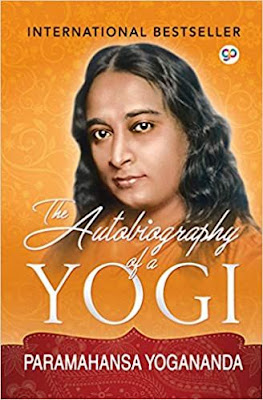Some books cannot be reviewed, but people still review them. One such book is The Autobiography of a Yogi by Paramahansa Yogananda. Not because one will invite divine wrath by being critical or humanly wrath of the followers of a cult figure. But because the intent behind reading such a book is what decides how good or bad the book is.
My review of The Autobiography of a Yogi, thus, is not a standard-format review but a guide to potential readers whether to go for this book or not.
This autobiography, over 400 pages, has influenced millions of people worldwide. Among them are people who already were influenced by him or his teachers and some those who were influenced after reading the autobiography.
The Wikipedia page on the book reveals that among westerners greatly influenced by the book include Steve Jobs (Co-founder of Apple Inc.), Marc Benioff (Founder of Salesforce.com), Elvis Presley ("the king of rock and roll") and a number of leading actors and actresses. The book was designated as one of the "100 Most Important Spiritual Books of the 20th Century" by a panel by Harper Collins. Millions of copies of the book have been published so far in over 50 languages.
If you are spiritually-inclined and believer on one hand and on the other a good reader who has the patience to read such a long non-fiction book, this book is for you. For you, the book will be like 5 stars out of 5. It is an absorbing book as it is narrated in a story-like fashion and has numerous fascinating anecdotes. Many of them are first-hand experiences of the yogi, and believable - if you have a reason to believe that the yogi had attained super-human powers/ vision.
If you are a westerner seeking to understand ancient Indian wisdom, this book may only be partially right for you. Your own religious beliefs and experiences might come in conflict with a lot of what the yogi narrates, though he spent a good part of his life in the west and has a big following in the US and other countries in the west. Of course, there is also a chance that some aspects of oriental thought and life might astonish you with its depth and richness.
Please note that the beliefs that he and his ashram hold are just one of the numerous strands of ancient Indian wisdom. This book might expose you to some aspects of that but you must [also] go for genuine commentaries on Hindu/ Budhist/ Jain scriptures available on the web, including YouTube.
If you are a rationalist or seeker of the ultimate truth through scientific inquiry, you have the risk of swinging between accepting and rejecting the claims made in the book. If you have a strong notion of 'scientific scrutiny', you might even feel uncomfortable now and then. I warn that you might not be able to finish the book, unless you are determined.
If you thought this is biography of an Indian yogi written in a dispassionate, matter-of-factly manner, you may feel disappointed. It is highly subjective. But no autobiography can be fully objective even if the author's narration is very authentic. In this case, the author is conscious that he is propagating a certain form of belief (which he asserts that he is destined to do), and he does not make bones about it. There is no proof of the numerous attainments of his or others; this is his version and it is for you to take it or leave it.
In any case, if you cannot have an open mind to at least partially believe what the yogi claims, you should not venture to read the book.
Summary of The Autobiography of a Yogi
So that you make the right decision (to read it or not), let me give a summary of the book:
Born as Mukunda Lal Ghosh, Yogananda was an ordinary child born to a Bengali family in the eastern part of India, but had extra-ordinary inclination towards spirituality from the very beginning. At a young age, he could see the forewarning about his mother's death.
During Mukunda's boyhood, his spiritual experiences continued and he was attracted towards sages, some of which were revered by his parents. At one stage, his urge to find a spiritual teacher to guide him against worldly doubts grew so much that despite resistance from his elders in the family he proceeded on a pilgrimage to to the holy city of Benaras (now Varanasi), where he found his spiritual guru.
He had seen his to-be guru, Yukteswar Giri, before meeting him, so within minutes of the meeting, they became the guru and the disciple. Among many yogic practices, one special procedure of higher attainment that the guru taught him was kriya yoga.
He continued to have many spiritual, mystic, even super-human experiences during his stay with his guru and elsewhere. Back in Bengal, he did his graduation, along with spiritual practice under the
guru.
After he received the monastic vow, he became known as Swami Yogananda Giri. After becoming a swami (religious teacher), Yogananda became interested in teaching spirituality to the society. He first opened a progressive school in West Bengal, in which spirituality was taught along with modern education. Following divine guidance, he went to the US to teach yoga and spirituality. He soon founded the Self-Realization Fellowship in Los Angeles, which later became an international organization.
During a visit to India, his guru conferred him the title Paramahansa (literally "supreme swan" or one who has attained spirituality of the highest order). In India, he met with spiritual gurus and other opinion leaders and established his presence, but most of his attention was focused on America.
Beyond the biographical part, his teachings are sprinkled here and there in the book as you can expect in an autobiography written by a religious preacher.
